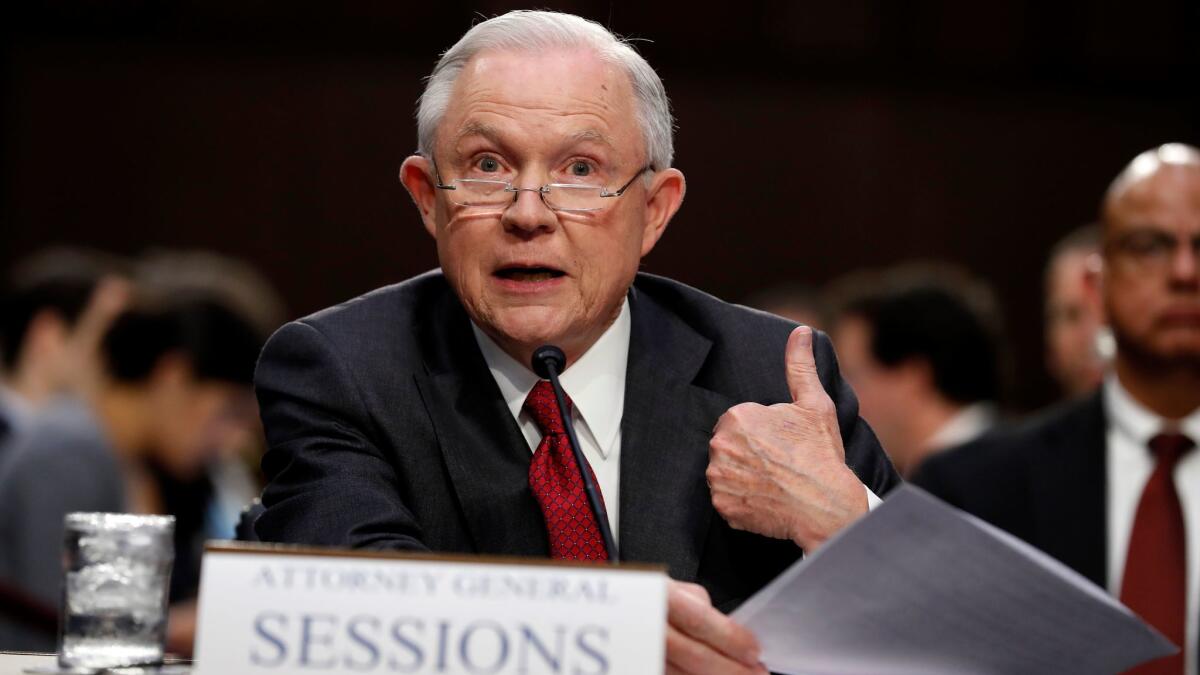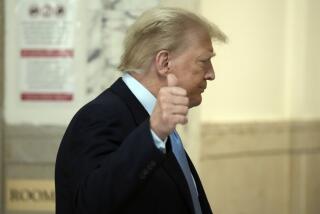Sessions again refuses to answer questions about his talks with Trump before Comey firing

Atty. Gen. Jeff Sessions, facing barbed questions Wednesday from some former Senate colleagues, once again heatedly denied any improper dealings with Russian officials while working with the Trump campaign.
In sharp exchanges with Democrats on the Senate Judiciary Committee, where he served for 20 years, Sessions defended his evolving statements on three conversations with the former Russian ambassador.
He also continued to defend the firing of former FBI Director James B. Comey in May, even as he stood firm in his refusal to reveal anything President Trump told him about his reasons for the firing.
And he said that although reporters haven’t been targeted aggressively by the administration’s efforts to end leaks, he could not guarantee that he would not to try to jail a journalist who published classified information.
“I don’t know that I can make a blanket commitment,” he said.
The hearing, the first time Sessions has appeared on Capitol Hill since June, was a reminder of how questions about Russia continue to cloud the Trump administration and especially the Justice Department.
Sessions recused himself from any dealings with the Russia probe soon after being confirmed, but that has not spared him from continued questions about his involvement – or from Trump’s wrath. The president went on a Twitter tirade this summer about the investigation, blaming Sessions’ recusal for what he called a “witch hunt” by special counsel Robert S. Mueller III.
“Well, people are quite free in this country to express their views about matters of that kind,” Sessions said dryly. “I’m just an old prosecutor who says the process has to work its will.”
Sessions said he was willing to cooperate with Mueller’s investigation, but that the special counsel has not asked him for an interview.
Both Republicans and Democrats said they still expected answers about the reasons behind Comey’s firing.
“The American people have a right to know why he was fired, especially in the middle of so many high-profile issues going on, including the investigation into Russian interference in the 2016 elections,” Chairman Charles E. Grassley (R-Iowa) said in opening remarks.
In testimony earlier this year before the Senate Intelligence Committee, Sessions said he and Deputy Atty. Gen. Rod J. Rosenstein agreed that Comey needed to go because of his decision to talk publicly about the investigation into Hillary Clinton’s email practices while she was secretary of State — and his defense of those statements before Congress.
“I don’t think it’s been fully understood, the significance of the error that Mr. Comey made on the Clinton matter,” Sessions said on Wednesday. “Particularly, we were concerned that he reaffirmed that he would do it again.”
But Sessions turned aside questions about whether Trump’s real motivation for firing Comey was a desire to end the investigation into Russian interference in the 2016 election and possible collusion with the Trump campaign. After Comey’s firing, Rosenstein appointed Mueller, a former FBI director, as special counsel.
“That calls for a communication I’ve had with the president, and I believe it remains confidential,” Sessions said. Pressed by Sen. Dianne Feinstein (D-Calif.) about whether that meant Trump did say something about Russia, Sessions said he “cannot confirm or deny the existence of any communication with the president that I consider confidential.”
Sessions told senators that he needs to protect a tradition of private conversations between the president and aides. But Democrats said he had no legal basis to refuse to answer; Trump has not invoked executive privilege, which might force a legal confrontation between the White House and Congress.
“My concern is you were part of the Russia facade, and you went along with it,” said Sen. Patrick Leahy (D-Vt).
“I’m not part of a facade,” Sessions said, adding that he was “hurt” by the question from a former colleague.
Sessions’ shifting statements on his conversations with Russian officials sparked sharp exchanges as Democrats pressed him on whether he misled the committee in previous testimony.
In January, Sessions testified that he “did not have communication” with Russian officials, but news accounts later revealed three meetings with Russia’s then-ambassador. Leahy pressed Sessions on whether he had given “false testimony.”
Sessions said he had understood the questions as senators wanting to know if he had talked with Russians about interfering in the election.
“Every one of your previous questions was about improper involvement, and I felt the answer was no,” Sessions said.
The attorney general got testy when Sen. Al Franken (D-Minn), who was one of his interrogators in the January session, accused him of “moving the goalposts” on his answers about Russia. His current statements are “very different from saying, ‘I have not had conversations with the Russians,’” Franken said.
But Sessions said he had been “taken aback” by Franken’s question toward the end of a long day and said he had made a “good faith response” denying collusion. “I don’t think it’s fair for you to suggest otherwise,” he said.
The appearance came after a tumultuous summer during which Sessions endured a barrage of public criticism from Trump, even as he aggressively moved to champion tough policies on crime and immigration.
When Trump decided to end the Deferred Action for Childhood Arrivals program, it was Sessions who delivered the news.
In his opening remarks, Sessions said DACA was “unlawful and contrary to the laws passed by this institution.”
Sessions, a hard-liner on immigration issues during his time in the Senate, said he hadn’t changed his views that people who enter the country illegally should not be eligible to receive citizenship or government benefits.
“If people are here unlawfully, it seems to me the last thing you want to do is subsidize that unlawfulness,” he said.
But he added that Trump remains interested in working with Congress to find a legislative solution for the approximately 700,000 young immigrants who have been protected from deportation by the DACA program. “The president has said he wants to work with Congress. He has a heart for young people,” he said.
Sessions also defended his controversial policy of trying to deny federal grants to so-called sanctuary cities that don’t cooperate with immigration enforcement.
Sen. Richard J. Durbin (D-Ill.) said Sessions’ policy was at odds with his promises to help stop violent crime in cities like Chicago.
“You want to cut off federal funds to that city, and come here and criticize the murder rate,” Durbin said. “You can’t have it both ways.”
Sessions said he only expected cities and counties to inform immigration agents when a prisoner who is in the country illegally is about to be released. “It’s amazing to me that some of the mayors are so reluctant and so hostile to that simple request,” he said.
Twitter: @jtanfani
ALSO
Female lawmakers, staffers and lobbyists speak out on ‘pervasive’ harassment in California’s Capitol
Opioid law draws scrutiny after Trump’s pick for drug czar steps aside
UPDATES:
3:25 p.m.: This article has been updated throughout with additional testimony and details from the hearing.
10:40 a.m.: This article was updated with additional testimony.
This article was originally published at 8:20 a.m.
More to Read
Get the L.A. Times Politics newsletter
Deeply reported insights into legislation, politics and policy from Sacramento, Washington and beyond. In your inbox three times per week.
You may occasionally receive promotional content from the Los Angeles Times.







